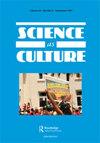通过血统基因组学来协商威斯康星州的比利时身份
IF 2.5
3区 哲学
Q1 CULTURAL STUDIES
引用次数: 0
摘要
居住在威斯康星州的比利时移民后裔——居住在中西部以白人为主的农村社区——如何通过基因组血统测试(GAT)将共同的比利时血统与当代归属感联系起来?这个社区的成员就GAT的结果与他们先前对比利时血统的自我认同和现在的认同主张进行了谈判,突出了两个重要的发现。首先,在这个群体中,先前对比利时血统和现在身份的自我认同对于理解群体成员如何协商GAT结果很重要。GAT的结果对群体成员来说是有意义的,只要它们能够以一种重新建立联系的历史和社会生活经历的方式来解释,这种联系和社会生活经历支撑着特定的“比利时”身份。其次,STS研究人员更感兴趣的另一个特征是,没有特定的基因组标记明确地将个体与“比利时”祖先联系起来。缺乏比利时血统的基因组标记最终使社会对结果的解释变得灵活。尽管没有从测试中衍生出“比利时”类别,但社区成员通过基因组结果间接地和创造性地确定了他们的比利时血统。因此,在基因祖先测试最终渗透到日常实践的方式上有很大的灵活性。本文章由计算机程序翻译,如有差异,请以英文原文为准。
Negotiating Belgian identity in Wisconsin through ancestry genomics
ABSTRACT How do Wisconsin-based descendants of Belgian immigrants – living in a mid-western, largely white, and mostly rural community – connect a perceived common Belgian ancestry to a contemporary sense of belonging through genomic ancestry testing (GAT)? Members of this community negotiate GAT’s results in relation to their prior self-identification with Belgian ancestry and present-identity claims, highlighting two important findings. First, in this community, prior self-identification with both Belgian ancestry and present-day identity are important for understanding how group members negotiate GAT’s results. GAT results have meaning for group members as long as they can be interpreted in a way that re-establishes the histories of connectedness and social life experiences that underpin a specifically ‘Belgian’ identity. Second, another feature of more interest for STS researchers is that there are no specific genomic markers clearly linking individuals to a ‘Belgian’ ancestry. The lack of genomic markers for Belgian ancestry ends up enabling a socially flexible interpretation of results. Indirectly and with inventiveness, community members establish their Belgian ancestry through the genomic results, despite the absence of a ‘Belgian’ category derivable from the tests. As such, there is significant flexibility in the way that genomic ancestry testing ends up filtering into everyday practices.
求助全文
通过发布文献求助,成功后即可免费获取论文全文。
去求助
来源期刊

Science As Culture
Multiple-
CiteScore
5.20
自引率
3.80%
发文量
28
期刊介绍:
Our culture is a scientific one, defining what is natural and what is rational. Its values can be seen in what are sought out as facts and made as artefacts, what are designed as processes and products, and what are forged as weapons and filmed as wonders. In our daily experience, power is exercised through expertise, e.g. in science, technology and medicine. Science as Culture explores how all these shape the values which contend for influence over the wider society. Science mediates our cultural experience. It increasingly defines what it is to be a person, through genetics, medicine and information technology. Its values get embodied and naturalized in concepts, techniques, research priorities, gadgets and advertising. Many films, artworks and novels express popular concerns about these developments. In a society where icons of progress are drawn from science, technology and medicine, they are either celebrated or demonised. Often their progress is feared as ’unnatural’, while their critics are labelled ’irrational’. Public concerns are rebuffed by ostensibly value-neutral experts and positivist polemics. Yet the culture of science is open to study like any other culture. Cultural studies analyses the role of expertise throughout society. Many journals address the history, philosophy and social studies of science, its popularisation, and the public understanding of society.
 求助内容:
求助内容: 应助结果提醒方式:
应助结果提醒方式:


